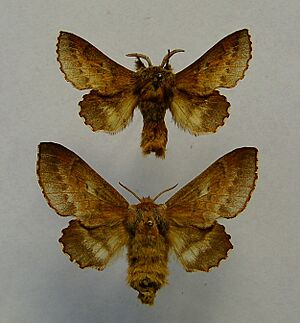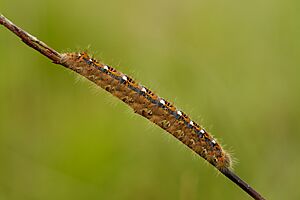Small lappet moth facts for kids
Quick facts for kids Small lappet moth |
|
|---|---|
 |
|
| Conservation status | |
| Scientific classification | |
| Synonyms | |
|
The small lappet moth (Phyllodesma ilicifolia) is a type of moth. It belongs to a family of moths called Lasiocampidae. A famous scientist named Carl Linnaeus first described this moth in 1758. You can find these moths across Europe and in some parts of Asia.
Contents
What Does the Small Lappet Moth Look Like?
The small lappet moth is a medium-sized moth. It measures about 35 to 40 millimeters (about 1.4 to 1.6 inches) wide.
Its Wings
Its front wings, called forewings, are a brownish-red color. They have tiny white speckles on them. You might see two dark grey lines that look wavy and broken. There's also a dark grey spot in the middle of the wing. The edges of the front wings have a wide band of white speckles. The tiny hairs on the edges of the wings, called cilia, are white with dark reddish bars.
The back wings, or hindwings, are a purplish-brown color. They have two soft, whitish bands across them.
Its Caterpillar
The caterpillar of the small lappet moth can be grey or reddish. It has reddish hairs all over its body. A black line runs down its back, broken up by reddish spots. Its sides are blue-grey and also have breaks in their pattern.
Where Do Small Lappet Moths Live?
The small lappet moth lives in many different countries. You can find it in places like Austria, Belgium, China, and France. It also lives in Germany, Italy, Japan, and Norway. Other countries include Poland, Russia, Spain, Sweden, and Ukraine. These moths prefer certain types of environments, or habitats, where they can find their food.
The Life Cycle of the Small Lappet Moth
The small lappet moth goes through different stages in its life. This is called its life cycle.
Caterpillar Stage
The young moth, called a larva or caterpillar, eats leaves from plants. It especially likes plants from the Vaccinium family, like blueberries, and Salix plants, which are willows.
Pupa Stage
After growing, the caterpillar forms a protective case around itself. This is called a cocoon. Inside the cocoon, it turns into a pupa. The moth stays in this pupa stage during the cold winter months. This is called hibernating.
Adult Moth Stage
When spring arrives, the adult moth comes out of its cocoon. These moths are active at night during the summer. The female moth lays her eggs in groups, and then the life cycle starts all over again.
See also
- Gastropacha quercifolia (lappet moth)



